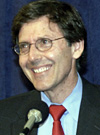
Arnold Kriegstein
Last Wednesday, President Bush issued his second veto of a bill that would have ended federal restrictions on human embryonic stem cell research. UCSF's Arnold Kriegstein, MD, PhD, director of the UCSF Institute for Regeneration Medicine, says the move puts a strain on a field that is just finding its wings.
He discussed the issue with
ABC World News.
Since Aug. 9, 2001, when Bush announced limited support for human embryonic stem cell research, Kriegstein explains, universities have been working to develop stem cell programs within the limits of the president's guidelines.
Under these rules, federal funds - the mainstay of university research - can only be used to study human embryonic stem cell lines that were derived by the August 9 cutoff date. They cannot be used to create new stem cell lines. Nor can researchers study new stem cell lines in federally funded lab space.
As a result, universities wanting to support a broad investigation of human embryonic stem cells have had to duplicate facilities or establish detailed auditing practices to ensure that nonfederally funded research does not rely on materials or resources used to support work funded by federal grants.
The process has been "cumbersome and wasteful," says Kriegstein, who oversees one of the largest university stem cell programs in the United States. "We've had to duplicate even basic instruments, such as pipettes, and media."
The funding restrictions have had a challenging effect on the field in other ways too, he says. Junior scientists just entering a field want assurance that federal grants will be available to support their work, and in the stem cell field they don't have this. With human embryonic stem cell research, they also need to know that universities will be able to provide them with nonfederally funded laboratory space.
"Lifting the federal restrictions would allow research to go forward on a much larger scale," he says.
At the same time, he notes, the federal restrictions have not stopped research. In California, the voter-driven initiative that has designated $3 billion in funding for stem cell research over 10 years has galvanized the field. In its wake, many state governments, including those of Connecticut, Massachusetts, New Jersey and New York, have stepped in to fund major initiatives, and private donors are helping to fuel university research enterprises.
It's particularly exciting to be here in California, says Kriegstein. "Ten years is long enough to get young people involved."
Overall, he says, he's discouraged by the temporary setback represented by the veto, but very optimistic about long-term progress for the field.
"There have been some very exciting research advances in the last year," he says. "Scientists are working very intently. There's a real push to gain insights into the causes of such diseases as cancer, and to develop new strategies for treating a variety of disease."
Photo/Christine Jegan
Related links:
California: the State of Stem Cell Funding
ABC News, June 21, 2007
UCSF Institute for Regeneration Medicine

